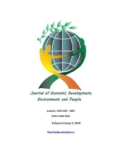Effect of Macroeconomic, Demographic, and Governance Factors on Income Inequality of Selected sub-Saharan Africa Countries
Effect of Macroeconomic, Demographic, and Governance Factors on Income Inequality of Selected sub-Saharan Africa Countries
Author(s): Dagim Tadesse BekeleSubject(s): Labor relations, Demography and human biology, Economic development, Present Times (2010 - today), Human Resources in Economy, Socio-Economic Research
Published by: Editura Fundaţiei România de Mâine
Keywords: Effect; Income Inequality; Two-step system GMM; Sub-Saharan Africa;
Summary/Abstract: This research tried to look effect of macroeconomic, demographic, and governance factors on income inequality in 34 sub-Saharan Africa countries by using unbalanced panel data spanning from 2010 to 2017. Two-step System GMM estimation is used for the econometrics analysis of the Dynamic Panel Data model. The finding revealed income inequality has a dynamic nature. Also, Kuznets’ hypothesis is worked in these countries: where economic growth is found to have a significant increasing effect on income inequality in short-run while in the long run, its’ effect is significant and decreasing. Population growth is the other variable that is found to have an increasing impact on income inequality. Differently, FDI and low perception of corruption decrease income inequality. Therefore, much focus will have to be given to achieve sustainable development objectives, promoting FDI, and controlling corruption. Also, managing the population growth is important.
Journal: Journal of Economic Development, Environment and People
- Issue Year: 9/2020
- Issue No: 1
- Page Range: 60-70
- Page Count: 11
- Language: English

